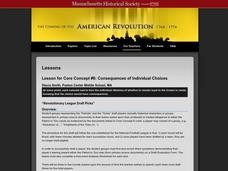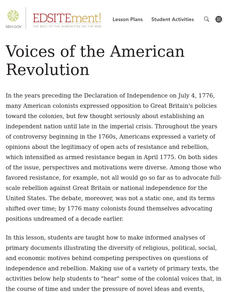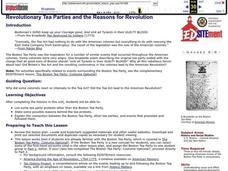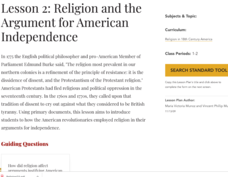Museum of the American Revolution
Historical Analysis: Objects Tell Stories
Dig this! Young archeologists discover what objects teach us about the past. The activity uses an image of a Revolutionary War artifact to help historians practice analyzing the past. Scholars study the object and complete a worksheet to...
Museum of the American Revolution
Object Observation: Purpose on a Powder Horn?
Young archeologists discover the significance of ordinary objects from the past in an interesting lesson on artifact analysis. The activity focuses on examining the image of a powder horn from the Revolutionary War to understand what it...
Curated OER
America Grows - Trailblazers Pave the Way
Students study the time period after the Revolutionary War when people were striving to move away from the coastal areas and look for pathways to the west. Westerward expansion is a central theme and students use a variety of resources...
Curated OER
Revolutionary Money
Examine paper money from the American revolution! Historians study the paper bills and discuss the history of money. How has money changed over the times? Activities are included.
Curated OER
The American Revolution: 1775-1783
Casting the American Revolution into a bright, informative light, this presentation details many key facts about the strategies and decision during the revolutionary campaigns. The latter half of the slides prompt viewers to examine why...
Roy Rosenzweig Center for History and New Media
Differences Among Colonial Regions
Classes look at and analyze primary source images to explore the differences between the colonial regions during the Revolutionary era. They break into groups to tackle each region and then present their findings to the class. A final...
Curated OER
Similarities and Differences Between the American Revolutionary War and the American Civil War
Fifth graders describe three similarities and three differences between the American Revolutionary War and the American Civil War. They play a game comparing the two wars.
Curated OER
Revolutionary War Research Paper
Fifth graders practice writing research papers by investigating U.S. history. In this Revolutionary War lesson plan, 5th graders identify the British and American roles in the historic war by researching the Internet. Students prepare a...
Curated OER
Changing Attitudes: Aging in America Lesson Plan
Young scholars discuss how the elder members of the community are viewed. Using the internet, they research how this view has changed since colonial times. They also identify ways in which this attitude keeps changing in modern America.
Curated OER
Differing Expectations
Students examine the expectations that colonists had for lives prior to the revolution. In this colonial America lesson, students read primary documents that feature the perceptions of white men and minorities during the time period....
Curated OER
Consequences of Individual Choices
Students simulate a Revolutionary War draft. In this American Revolution lesson, students participate in a classroom activity that requires them to advocate for the Patriots or the Tories. Students examine selected primary sources about...
Curated OER
From Rags to (Paper) Riches: Explore Colonial Papermaking
Students explore Colonial papermaking. In this Colonial America U.S. history lesson, students analyze two poems written in the 1690s about the Rittenhouse paper mill to learn about papermaking. Students produce their own...
Reading Through History
Patriots and Loyalists
Patriots versus Loyalists, a huge divide during the Revolutionary War in what would become the United States of America. An informative resource includes both direct instruction about the two groups and a quiz pupils take after reading...
Curated OER
An Empire in the Balance
Eleventh graders investigate the role of New York state during the American Revolution. In small groups, they research a particular region within colonial America, analyze primary source documents, complete Document Analysis Sheets, and...
Carolina K-12
Colonialism and American Foundations Sample Test Questions
What was the main cause of European colonization in America? How did Thomas Paine's Common Sense play a role in the establishment of the United States? What was the trans-Atlantic slave trade? These are just a few of the many questions...
Curated OER
Revolutionary Women of South Carolina
Students examine multiple primary sources. In this revolutionary war lesson, students read case studies regarding women from South Carolina. Students will compare the different roles women played during the Revolutionary War. Students...
Curated OER
Voices of the American Revolution - Primary Documents
Students use primary documents to examine the attitudes and positions of several factions leading up to the American Revolutionary War. They read documents, debate differing perspectives and write an essay exploring the reasons for revolt.
Curated OER
One Room School House Reading Lesson
Students explore schools during the Colonial period. In this American history instructional activity, students participate in a simulation of school days in Colonial America. Students visit a museum and use the schoolhouse as a setting...
Curated OER
Johnny Tremain/Boston Tea Party
Fifth graders understand chronological order of events. In this Boston Tea Party lesson, 5th graders compare the events surrounding the Boston Tea Party to current times. Students learn vocabulary and customs of the revolutionary times....
Curated OER
Revolutionary Tea Parties and the Reasons for Revolution
Students identify tea party protests other than the Boston Tea Party, state some possible reasons behind the tea protests, and explain the connection between the Boston Tea Party, other tea parties, and events that preceded and followed...
Curated OER
Colonial America and the American Revolution
Learners research the Saratoga Campaign and its importance in the overall outcome of the Revolutionary War. They consider French involvement in the war and what the Paris Peace Treaty meant for the new Americans.
National Endowment for the Humanities
Lesson 1: The United States Confronts Great Britain, 1793–1796
After the Revolutionary War, the success of the United States was far from guaranteed. Foreign powers coveted the new land, and Great Britain challenged American sovereignty. Learners consider the challenges facing the new nation using...
National Endowment for the Humanities
Lesson 2: Religion and the Argument for American Independence
Young scholars examine how religion affected arguments justifying American independence. They read and analyze primary source documents, and write an essay analyzing how Americans used religious arguments to justify revolution against a...
George Washington's Mount Vernon Estate & Gardens
George Washington: Centerpiece of a Nation
A neat Presidents Day activity, this instructional activity provides a culminating learning experience for upper elementary aged learners. After analyzing George Washington's, "A Display of the United States of America," your learners...























